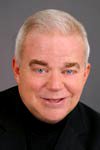 Jim Wallis. Photo courtesy Sojourners.
Jim Wallis. Photo courtesy Sojourners.Even though I've been involved in mainline American Protestantism for about 15 years and now, and I'm an ordained pastor of one of those mainline Protestant denominations, my roots are grounded in the traditional Black Church and Evangelicalism. In many ways, I classify myself as a "Liberal Evangelical" a mixture of conservative theology and liberal social action.
Slate has an interesting article on two strains of the so-called "religious left." One is led my Michael Lerner, who leads the Jewish magazine, Tikkun and the other is Jim Wallis who heads Sojourners magazine. The writer talks about how these two social movements could affect the Democrats in 2008. Here's the writers take on Michael Lerner's recent gathering of religious liberals:
There was a strong Christian presence among the 1,200 attendees at the NSP conference, but it leaned heavily toward liberal denominations. Quakers and Unitarians outnumbered Evangelicals and Catholics. They were joined by scores of liberal Jews, fewer Muslims, and a sprinkling of Buddhists, Sufis, Baha'i, Wiccans, Native American shamans, and various metrospiritual seekers. Even secular humanists were welcomed.
Together the attendees all prayed in concentric circles, sang John Lennon's "Imagine" (with the line "and no religion too" tastefully amended), and meditated while eating vegan boxed lunches. At times they seemed like a flock of black sheep. My breakout group of eight—led by a stunning Jewfi woman (Jew + Sufi = Jewfi) in ventilated Crocs sandals—included Unitarian and United Church of Christ pastors, a retired scientist looking to marry faith and reason, and a gay former Christian fundamentalist turned theatrical performance activist. Everyone was highly motivated, but I couldn't help wondering: How big can such a constituency be?
Lerner is undaunted by such concerns. His vision for the NSP is intentionally quixotic, and he doesn't expect to sway elections anytime soon. In fact, he's positively phobic of short-term thinking lest it compromise his vision. That vision, in Lerner's words, is "a new bottom line in American society" whereby policies and institutions are "judged efficient not only to the extent that they maximize money and power but also to the extent that they maximize love and caring." The conference's Spiritual Covenant with America included more concrete proposals on everything from corporate responsibility to foreign policy and the environment. But its scattershot approach puzzled some attendees. I tagged along with one on a Capitol Hill visit at which he handed the list to his Congressman's staffers and urged them to "just pick one thing, I don't care what it is. "
While Lerner is dealing with the more abstract, Wallis is more pragmatic. He wants to affect a change in the heart that will translate to the ballot box:
Wallis, on the other hand, is more focused. He wants to influence two voting blocs that will be critical to the 2008 election, moderate evangelicals and Catholics. His plan is to focus on poverty, an issue he believes all Christians can get behind, rather than ceding the floor to gay marriage and abortion, which the religious right uses to estrange Christians from the Democratic Party.
Wallis may be on to something. A 2004 Pew poll found that most evangelicals support increased spending on anti-poverty programs, rigorous environmental protection, and the fight abroad against HIV and AIDS. Groups like the National Association of Evangelicals (which represents some 45,000 churches and 30 million members nationwide) and the Evangelical Environmental Network have become increasingly vocal in their support of these Democrat-friendly faith issues.
Wallis' conference this week, Pentecost 2006, will bring hundreds of Christian activists to Washington to promote a Covenant for a New America aimed at eradicating poverty at home and abroad. Unlike Lerner's conference, Wallis' isn't going to be dominated by the liberal fringes: Among the speakers are Republican Sens. Rick Santorum of Pennsylvania and Sam Brownback of Kansas, two of the most prominent voices on the religious right.
I think if the Democratic Party is interested in getting back some of these moderate evangelicals, they would be wise to follow Wallis and not Lerner. Lerner's path is one that I'm familiar with. I've been part of and seen religious coalitions of the left and center that tend to be fuzzy minded and in the end, rather in effective to the onslaught of the far right. However, I think Wallis' track is more in line with past movements like the civil rights movement of the last century. Wallis and many like him are more interested in dealing with the issues at hand; combatting poverty, dealing with HIV/AIDS, and tackling global warming. Wallis' movement also could even change the Republican party as well. There are many religious Republicans who care more about the "least of these" than they do about gay marriage. Notice that among the speakers at Wallis' conference is Kansas Senator Sam Brownback, a very fundamentalist Republican who nonetheless is interested in issues like HIV/AIDS and Darfur. Lerner's view is basically a nice gathering of liberals who like listen to each other and sing "kum-ba-yah."
American Evangelicalism has never been monolithic. The problem is that for far too long, the Pat Robertsons of the world have been the loudest voices. There has long been a stream of evangelicals who believed in social change, but they have not attracted the attention of the wider public. I believe that will change.
Hallelujah.




1 comment:
good points. I've blogged a bit here and there about lerner and some of these related issues. I didn't necessarily see Lerner as fuzzy-headed or anti-pragmatic, but i think you have a point that it is important to use your head and think about the immediate political consequences of whatever a spiritual left movement ends up doing.
Post a Comment